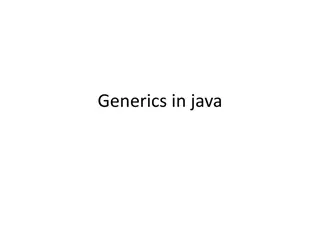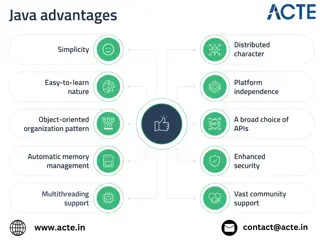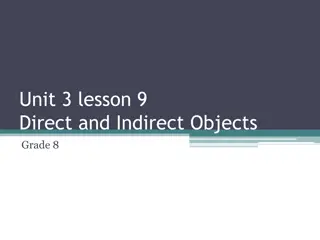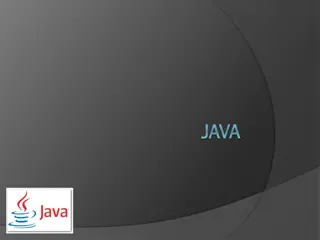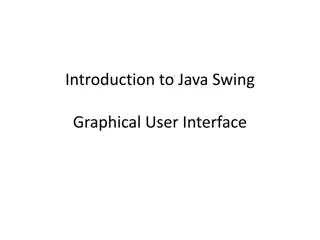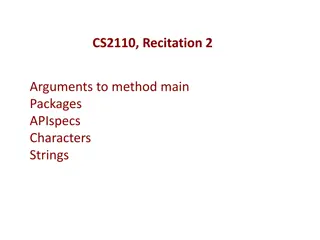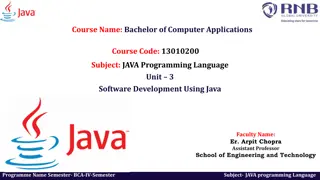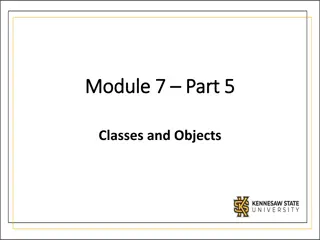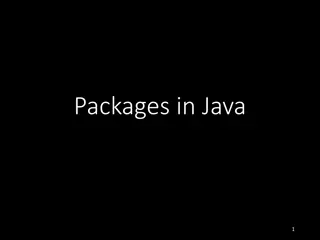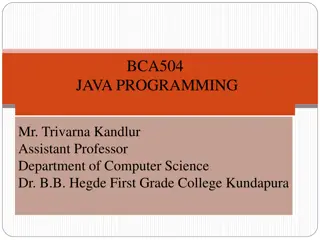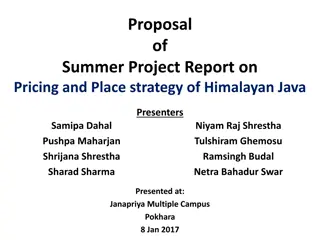Understanding Parameters and Objects in Java Programs
Explore the concepts of parameters and objects in Java programming, including examples of redundant recipes, a parameterized recipe, and a redundant solution. Learn how parameterization can streamline coding by passing values to methods, improving code efficiency. Discover the importance of variables, constants, and better solutions in Java programming.
Download Presentation

Please find below an Image/Link to download the presentation.
The content on the website is provided AS IS for your information and personal use only. It may not be sold, licensed, or shared on other websites without obtaining consent from the author. Download presentation by click this link. If you encounter any issues during the download, it is possible that the publisher has removed the file from their server.
E N D
Presentation Transcript
BUILDING JAVA PROGRAMS CHAPTER 3 PARAMETERS AND OBJECTS
REDUNDANT RECIPES Recipe for baking 20 cookies: Mix the following ingredients in a bowl: 4 cups flour 1 cup butter 1 cup sugar 2 eggs 40 pounds chocolate chips Place on sheet and bake for about 10 minutes Recipe for baking 40 cookies: Mix the following ingredients in a bowl: 8 cups flour 2 cup butter 2 cup sugar 4 eggs 80 pounds chocolate chips Place on sheet and bake for about 10 minutes 3
PARAMETERIZED RECIPE Recipe for baking 20 cookies: Mix the following ingredients in a bowl: 4 cups flour 1 cup butter 1 cup sugar 2 eggs 40 pounds chocolate chips Place on sheet and bake for about 10 minutes Recipe for baking N cookies: Mix the following ingredients in a bowl: N/5 cups flour N/20 cup butter N/20 cup sugar N/10 eggs 2N pounds chocolate chips Place on sheet and bake for about 10 minutes 4
REDUNDANT FIGURES Consider the task of printing the following lines/boxes: ************* ******* *********************************** ********** * * ********** ***** * * * * ***** 5
A REDUNDANT SOLUTION This code is redundant. public class Stars1 { public static void main(String[] args) { lineOf13(); lineOf7(); lineOf35(); box10x3(); box5x4(); } Would variables help? Would constants help? What is a better solution? public static void lineOf13() { for(int i = 1; i <= 13; i++) { System.out.println( * ); } System.out.println(); } Line a method to draw a line of any number of stars Box a method to draw a box of any size public static void lineOf7() { for(int i = 1; i <= 7; i++) { System.out.print( * ); } System.out.println(); } public static void lineOf35() { for(int i = 1; i <= 35; i++) { System.out.print( * ); } System.out.println(); } 6
PARAMETERIZATION Parameter:A value passed to a method by its caller Instead of lineOf7, lineOf13, write line to draw any length When declaring the method, we will state that it requires a parameter for the number of stars. When calling the method, we will specify how many stars to draw 7
DECLARING A PARAMETER Declaring a parameter: Stating that a method requires a parameter in order to run. The variable used in the parameter declaration is called the Formal Parameter. public static void name (type name) { statements(s); } Example: public static void sayPassword(int code) { System.out.println( The password is: + code); } When sayPassword is called, the caller must specify the integer code to print 8
PASSING A PARAMETERS Passing a parameter: Calling a method and specifying values for its parameters. The value specified is called the actual parameter or Argument I will refer to it as the argument. name(expression); Example: public static void main(String[] args) { sayPassword(42); sayPassword(12345); } Output: The password is 42 The password is 12345 9
PASSING A PARAMETERS What would the line code look like to print a line of stars of any length I want? Public static void line(int stars){ for(int i=1; i<= stars; i++){ } System.out.println(); } The method call in would look like The Formal Parameter is: stars System.out.print( *); The Actual Parameters or Arguments are: 7 and 13 line(7); line(13); 10
PARAMETERS AND LOOPS A parameter can guide the number of repetitions of a loop public static void main(String[] args) { chant(3);//call } public static void chant(int times) { for( int i = 1; i <= times; i++) { System.out.println( Just a salad ); } } Just a salad Just a salad Just a salad Output: 11
HOW PARAMETERS ARE PASSED When the method is called: A copy of the value is stored into the parameter variable The method s code executes using that value public static void main(String[] args) { chant(3); chant(7); } public static void chant(int times) { for (int i = 1; i <= times; i++) { System.out.println("Just a salad..."); } } 12
LIMITATIONS OF PARAMETERS public class PrameterExample2{ public static void main(String[] args){ int x=17; doubleNumber(x); System.out.println( x = + x); System.out.println(); int number = 42; doubleNumber(number); System.out.println( number = + number); } public static void doubleNumber(int number){ System.out.println( Initial value = + number); number = number * 2; System.out.println(number); } } 13
COMMON ERRORS If a method accepts a parameter, it is illegal to call it without passing any value for that parameter. chant(); // ERROR: parameter value required The value passed to a method must be of the correct type. chant(3.7); // ERROR: must be of type int 14
MULTIPLE PARAMETERS A method can accept multiple parameters. (separate by , ) When calling it, you must pass values for each parameter. Declaration: public static void name (type name, ..., type name) { statement(s); } Call: methodName (value, value, ..., value); 15
MULTIPLE PARAMETERS EXAMPLE public static void main(String[] args) { printNumber(4, 9); printNumber(17, 6); printNumber(8, 0); printNumber(0, 8); } public static void printNumber(int number, int count) { for (int i = 1; i <= count; i++) { System.out.print(number); } System.out.println(); } Output: 444444444 171717171717 00000000 Modify the Stars program to draw boxes with parameters. 16
STARS SOLUTION // Prints several lines and boxes made of stars. // Third version with multiple parameterized methods. public class Stars3 { public static void main(String[] args) { line(13); line(7); line(35); System.out.println(); box(10, 3); box(5, 4); box(20, 7); } // Prints the given number of stars plus a line break. public static void line(int count) { for (int i = 1; i <= count; i++) { System.out.print("*"); } System.out.println(); } } 17
STARS SOLUTION CONTINUED ... // Prints a box of stars of the given size. public static void box(int width, int height) { line(width); for (int line = 1; line <= height - 2; line++) { System.out.print("*"); for (int space = 1; space <= width - 2; space++) { System.out.print(" "); } System.out.println("*"); } line(width); } } 18
VALUE SEMANTICS value semantics: When primitive variables (int, double)are passed as parameters, their values are copied Modifying the parameter will not affect the variable passed in. public static void strange(intx) { x = x + 1; System.out.println("1. x = " + x); } public static void main(String[] args) { int x = 23; strange(x); System.out.println("2. x = " + x); ... } 19
PARAMETER MYSTERY PROBLEM public class ParameterMystery { public static void main(String[] args) { int x = 9; int y = 2; int z = 5; mystery(z, y, x); mystery(y, x, z); } public static void mystery(int x, int z, int y) { System.out.println(z + " and " + (y - x)); } } Output : 2 and 4 Output: 9 and 3 20
STRINGS string: A sequence of text characters. String name = "text"; String name = expression; Examples: String name = "Marla Singer"; int x = 3; int y = 5; String point = "(" + x + ", " + y + ")"; 21
STRINGS AS PARAMETERS public class StringParameters { public static void main(String[] args) { sayHello("Marty"); String teacher = "Bictolia"; sayHello(teacher); } public static void sayHello(String name) { System.out.println("Welcome, " + name); } } Output: Welcome, Marty Welcome, Bictolia 22
STARS SOLUTION CONTINUED ... // Prints a box of stars of the given size. public static void box(int width, int height) { line(width); for (int line = 1; line <= height - 2; line++) { System.out.print("*"); repeat(" ", width - 2); System.out.println("*"); } line(width); } // Prints the given String the given number of times. public static void repeat(String s, int times) { for (int i = 1; i <= times; i++) { System.out.print(s); } } } 23
WHAT IF I WANTED A PROGRAM THAT SPECIALIZED IN ALL KINDS OF BOXES Because these are all Variations on the same Box idea and because I Used the same method name But changed the Formal parameters it is Legal and called Method Overloading .} public static void box(){ .} public static void box(int square){ .} public static void box(int width,int height){ Try it. 24
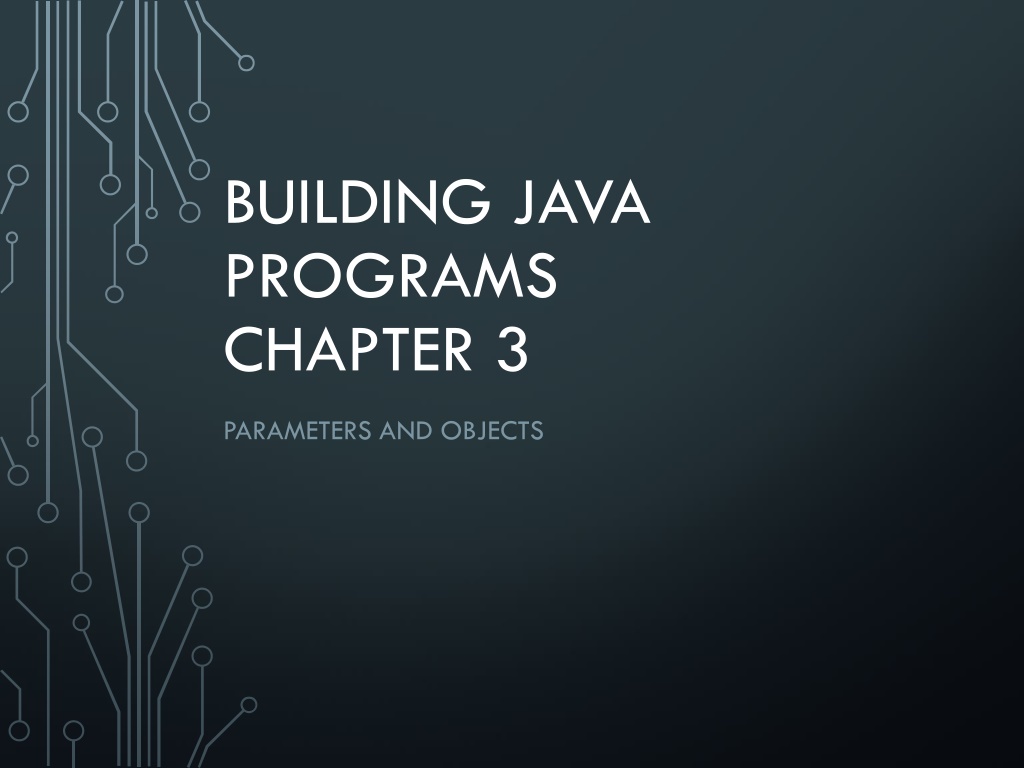
 undefined
undefined






